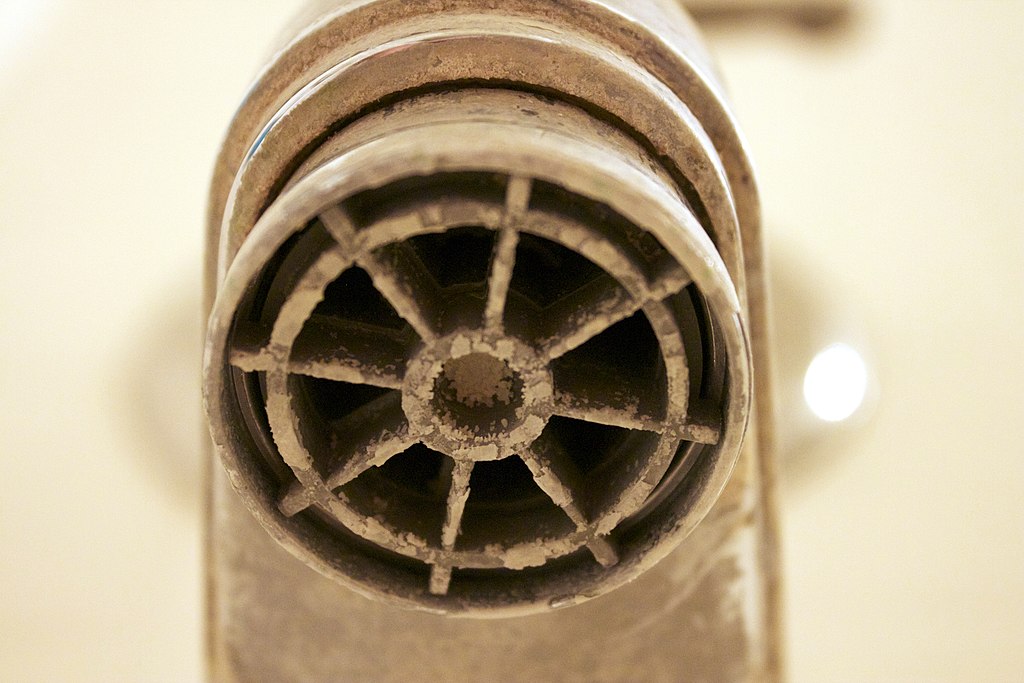
In May, amidst the lockdown, we received a higher number of calls than normal relating to problems with blocked pipes and scale.
HOW CAN SCALE AFFECT YOU?
Well, just 1mm of scale build up can add 10% to your heating bill so lime scale can cost you money! It will also cause problems with water pressure and in certain cases can affect your hot water supply.
WHAT TO DO AND WHEN.
What do you do when – You experience a reduction in water pressure isolated to one or two taps.
Before you call your plumber check the tap filters on the effected taps / shower heads and clean them if they are blocked.
What do you do when water pressure is poor on both hot and cold supply?
Call your plumber you may have a blockage on your water meter, have a faulty water pressure reducing valve or there may be a blockage in the domestic water supply. If the fault is within your water system, simply cleaning particles from valves and flexi hoses may be all that is needed however in more extreme cases your pipe work will need flushing through.
What do you do when – There is poor flow on the hot supply only.
Call your plumber it is likely that the heat exchanger on your gas water heater is blocked or restricted by calcium build up on. Solutions may include a professional descale or you may be in the market for a replacement heat exchanger or Water Heater (sorry!)
What do you look for if you have NO WATER at all.
Before you call the plumber and start to think the worst check if your water supply been turned off by the authorities for maintenance work? Or if your mains shut off tap is closed. If you have had a large water consumption you may be unaware that the water authorities have closed the tap for you or it may closed as a result of a practical joker!
PREVENTING PROBLEMS WITH SCALE AND PARTICAL BUILD UP.
There are several ways to protect your home.
IN LINE FILTERS.
Protect your water system from particles entering through your incoming water supply by fitting an inline filter. In most cases this will be a simple and inexpensive installation.
WATER SOFTENERS.
Keep Lime scale away altogether! A water softener can remove calcium from the water supply. Your water will be softer, your shampoo and detergents will go further and with scale removed from the water system your appliances will be protected from lime scale build up. Shower screens should also stay cleaner.
AN INTERESTING FACT….
Totally soft water will actually corrode your pipes! Because of this a small level of hardness is always maintained with between 4 and 6 degrees of hardness the optimum level.
ANOTHER INTERESTING FACT….
Although lime scale is removed with the use of a softener other chemicals like magnesium can remain so you may still experience chalky deposit in your kettle!
SOFTENER ALTERNATIVES.
A large number of water treatment devices are available, some more effective than others. Of the many options the hydropower scale units are scientifically proven to be vastly more effective than their magnetic brothers and sisters and 100% Plumbing are the sole distributor in the Northern Alicante area.
The unit uses electric fields which are amplified through the water system and prevents scale from adhering to pipes, heat exchangers and appliances by putting scale particles into suspension.
What does this mean?
This means that although scale remains present it cannot build up inside pipes to then cause a restricted flow. In fact with these units existing lime scale does in fact break down cleaning your pipes on the inside. A noticeable consequence of fitting this type of unit is that tap filters will need to be cleaned out regularly until existing scale is removed from the system.
OTHER CHEMICAL BADDIES
If you have a gas fired combination boiler and seem to be continually replacing your heat exchanger it may be that oxidization within your under floor heating circuit is the cause of your problems. Oxidization can corrode the inside of your boiler causing particles of the heat exchanger to make their way into the under floor heating circuit that eventually cause blockages within the same heat exchanger. An under floor heating system should be installed without an O2 protection barrier but if this is not the case a chemical additive can provide a simple an inexpensive solution to the problem.





